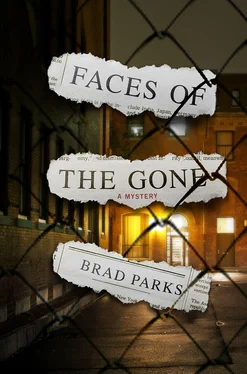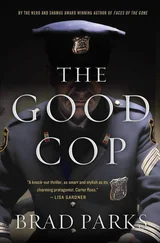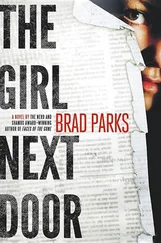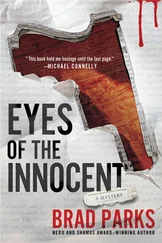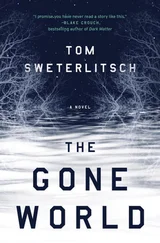Brad Parks - Faces of the Gone
Здесь есть возможность читать онлайн «Brad Parks - Faces of the Gone» весь текст электронной книги совершенно бесплатно (целиком полную версию без сокращений). В некоторых случаях можно слушать аудио, скачать через торрент в формате fb2 и присутствует краткое содержание. Год выпуска: 2010, ISBN: 2010, Издательство: Minotaur Books, Жанр: Триллер, на английском языке. Описание произведения, (предисловие) а так же отзывы посетителей доступны на портале библиотеки ЛибКат.
- Название:Faces of the Gone
- Автор:
- Издательство:Minotaur Books
- Жанр:
- Год:2010
- ISBN:9780312574772
- Рейтинг книги:3 / 5. Голосов: 1
-
Избранное:Добавить в избранное
- Отзывы:
-
Ваша оценка:
- 60
- 1
- 2
- 3
- 4
- 5
Faces of the Gone: краткое содержание, описание и аннотация
Предлагаем к чтению аннотацию, описание, краткое содержание или предисловие (зависит от того, что написал сам автор книги «Faces of the Gone»). Если вы не нашли необходимую информацию о книге — напишите в комментариях, мы постараемся отыскать её.
Faces of the Gone — читать онлайн бесплатно полную книгу (весь текст) целиком
Ниже представлен текст книги, разбитый по страницам. Система сохранения места последней прочитанной страницы, позволяет с удобством читать онлайн бесплатно книгу «Faces of the Gone», без необходимости каждый раз заново искать на чём Вы остановились. Поставьте закладку, и сможете в любой момент перейти на страницу, на которой закончили чтение.
Интервал:
Закладка:
The early-evening newsroom scene was one of them: reporters straining to burnish their prose before deadline; editors roaming about, hungry for copy, pestering and pressuring the reporters to give it to them; designers forcing the jigsaw-puzzle pieces of stories, artwork, and advertisements to fit on a page. Once upon a time, in the hoary old days of our business, the primary motivation for finishing was getting to the bar. The local watering hole was essentially a second newsroom. Going to work the next day hungover and wearing yesterday’s clothes was not frowned upon. It may have even been encouraged.
Today’s newsroom bears little resemblance to the newsroom of yore. Sometime during the seventies, inspired by Watergate and the notion that a newspaper had the power to overthrow a president, journalism sobered out and grew up. Reporters became responsible members of society with degrees from respectable colleges and paychecks you could actually live on.
So the end-of-day hurry-up was about getting home to the family, where a respectable, SUV-driving, diet-soda-drinking life would continue to be led. The old-timers will tell you something was lost along the way, that journalism went so corporate it surrendered its soul. But I disagree. To me, journalism is still a calling, just as it was to our ruffled, alcoholic forefathers.
I believe the stories I write matter. I believe the world is a wonderful, chaotic, fascinating place and that I’ve done my job if I can help people understand it just a little better. I believe a free and vibrant press is an essential part of a free and great society.
And sure, it gets messy sometimes. What used to be known as journalism has morphed into this ugly, chimeralike beast collectively called “the media.” And “the media” has its faults, what with all the princess-chasing paparazzi, the sleazy tabloid folks, and, of course, the cliche-drenched local TV newscasters. But I’ll link arms with all those malcontents and proudly state the world is a much better place with us than it would be without us.
Take my current assignment. I’m sure someone who loves to bash “the media” would say I’m exploiting the death of four people by writing a story that sensationalizes violent crime. I disagree entirely. To me, I’m helping people make sense of a profoundly tragic act: the intentional taking of four human lives. And it would become even more tragic if we in the media-who have both the privilege and obligation of being society’s vocal cords-allowed such a terrible act to pass without commenting on it.
I was lost in that thought when the voice of Buster Hays, our resident aging crank, jolted me out of my reverie.
“Hey, Ivy, come over here a second,” he hollered. Hays grew up on 133rd Street in the Bronx and felt his common-man roots made him a superior journalist to an overeducated prep school boy like me. So he called me Ivy, no matter how many times I told him Amherst was not part of the Ivy League.
“What can I do for you,” I said as I walked up to his desk.
“This may be a shock to your delicate system, but it seems we’re putting out a newspaper that we plan to sell tomorrow, ” Hays said. “You got anything to add to that effort or are we going to have to wait until January to read what’s in your notebook?”
Hays was of the general opinion that reporters like me-who spent weeks developing more complex stories-were about as useful as paper cuts.
“Well, I think this thing might be drug related,” I said. “Tyrone Scott and Devin Whitehead both sold heroin.”
“Well, stop the presses,” Hays said, then announced to no one in particular, “Hey, Ivy boy here says two of the Ludlow Four were drug dealers ! Can you imagine that? Drug dealers! In Newark!”
“Dammit, Hays, this guy-”
“Look, Ivy, let me explain a little something to you,” Hays interrupted in a condescending manner, peering at me over the top of his reading glasses. “Just because someone who sold drugs is involved in a crime, it doesn’t make the crime drug related, okay?”
“Well, I know that, Hays, I just think your cop sources may be throwing this bar-robbery theory against the wall to see if it sticks,” I said, sounding whinier than I wanted to.
“Tell you what, Ivy, you get someone credible to say this thing is drug related, I’ll put it in tomorrow’s paper.”
“And who, in your mind, is credible?”
“I dunno. Why don’t you call the National Drug Bureau?” he suggested with a smirk.
The National Drug Bureau was a federal agency that targeted international drug smuggling. Every so often, we’d quote them crowing about another big bust at the airport, along with a picture of NDB agents preening in front of a pile of controlled dangerous substances. But they didn’t really concern themselves with street-level drug trafficking. Hays telling me to call the NDB for a story about Newark homicides was like phoning the Democratic National Committee and asking for comment on the Barringer High School student council race.
Then again, if I could convince some bored federal flak to give me a line or two, it’d be fun to throw it back in Hays’s sneering face.
“You know what, Hays? Fine. I’ll call the National Drug Bureau,” I said.
“Have fun wasting your time.”
“Yeah, well,” I said, groping for something to put Hays in his place. “It’s my time to waste.”
Retreating from the Dinosaur’s Den, I stomped back to my desk, all the while stewing that I hadn’t come up with a snappier rejoinder. It’s my time to waste ? Dammit. Couldn’t I have at least managed some kind of comeback that involved him filing his stories on an IBM Correcting Selectric II?
I hauled up the National Drug Bureau’s Web site, which featured whole photo galleries of agents posing in front of large piles of powdery junk, then clicked on their “For the Media” link. After about sixteen more clicks-government efficiency at work-I found a number for their Newark Field Office and the contact name L. Peter Sampson, Press Agent.
Agent Sampson’s voice mail informed me he was in the office today but currently unavailable. I looked at the clock. Five thirty-two. No way a federal bureaucrat was still hanging around. Luckily for me, his recording concluded by saying that if I was a reporter on deadline, I could call his cell phone.
“Why, yes, I just so happen to be a reporter on deadline,” I said out loud, to no one in particular, copying down the number. I hung up and immediately dialed it.
“Agent Sampson,” an enthusiastic, Boy Scout-sounding voice answered.
“Hi, Agent Sampson, Carter Ross from the Eagle-Examiner .”
There was a long pause on the other end. It has been explained to me that low-and mid-level PR people live in constant fear they’ll be fired because of something a miscreant like me puts in the newspaper. It turns them into sad little creatures, analogous to any timid, furry animal of your choosing. With few exceptions, they’re not all that smart, startle easily, and don’t like leaving their holes for long. Above all else, they hate surprises. And a reporter calling unsolicited after hours qualified as a surprise.
“What, what can I do for you?” he said cautiously.
He sounded very much like a guy who didn’t want the world to know his first name-L. Peter Sampson, indeed. I wondered what his friends called him. L. Pete? L. Peter? Or just plain L.?
“We’re working on a follow-up story about this quadruple homicide in Newark, the one down on Ludlow Street,” I said. “I’m looking into the theory that it’s drug related.”
“What makes you think it’s drug related?” L. Pete said, his voice quickening, sounding even more panicked.
I went into a brief summary of my reporting, glossing over the parts I didn’t really know and concluding, “. . so, it’d just be nice to have a quote from you guys saying a crime of this nature could be drug related.”
Читать дальшеИнтервал:
Закладка:
Похожие книги на «Faces of the Gone»
Представляем Вашему вниманию похожие книги на «Faces of the Gone» списком для выбора. Мы отобрали схожую по названию и смыслу литературу в надежде предоставить читателям больше вариантов отыскать новые, интересные, ещё непрочитанные произведения.
Обсуждение, отзывы о книге «Faces of the Gone» и просто собственные мнения читателей. Оставьте ваши комментарии, напишите, что Вы думаете о произведении, его смысле или главных героях. Укажите что конкретно понравилось, а что нет, и почему Вы так считаете.
